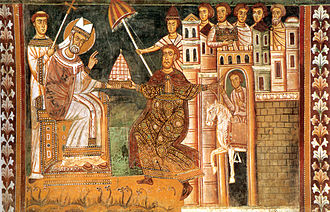On this last day of the calendar year, we celebrate in muted tones the mysterious and shadowy Pope Saint Sylvester I, who reigned from 314, the year after Constantine made Christianity legal after his momentous victory at the Milvian Bridge, until his death on this day in 335. But he must have been a vigorous man, for his reign was eventful: With her new-found legal status, the Church could build churches, and build she did, under the Pope’s direction: It is from this time that we have the magnificent Saint John Lateran, Santa Croce in Jerusalem, as well as the original Saint Peter’s Basilica – before the splendid renaissance structure we now know. There is also the ‘Donation of Constantine’, steeped in legend and controversy, with the emperor giving the Pope territory around Rome as a basis for the Church’s temporal apostolate and authority. Even if many historians now consider this an eighth century forgery, one never knows what historical roots it might have had. It is a truth that the Church needs some such temporal power to fulfill her spiritual mission, even if the overemphasis on this ‘temporal power’ would cause so much trouble in the Middle Ages, right up to the modern era (until the compromise reached with the Lateran Accord in 1929).
Sylvester also sent legates, Vitus and Vincentius, to the Council of Nicaea in 325, approving its decrees, including the condemnation of Arianism, defining for all time the divinity of Christ as homo-ousios, ‘consubstantial’, with the Father.
Stories told of Sylvester include that he cured the emperor of leprosy; that the emperor submitted to the Pope, walking on foot and leading him on horseback, a symbol that earthly power is subordinate to the spiritual that would culminate in Canossa, and is still a doctrine of our Faith. For our end is heaven, not this earth, the form of which is passing away.
There is an eschatological note to this final day of the calendar year, as there was a month ago in the end of the liturgical year with Christ the King, and the beginning of Advent. In the first reading this morning, the Apostle John warns of Antichrist, and that already many antichrists have come, whose spirit may be recognized primarily, as the Apostle warns elsewhere, in the denial of Christ’s Incarnation – see, Arianism, and Islam today. We may extend this. to include opposition to the Church, the sacraments, to the truth of the end and purpose of Man. As the Catechism puts it, the antichrist will preach a ‘secular messianism’, a salvation in this world alone, that our happiness and security are to be found in the here and now – in fact, ‘stay safe’ might be his motto. Hence, radical environmentalism – becoming more bizarre and cult-like, with such insanities as the ironically named ‘Extinction Rebellion’. Population control, socialism, hedonism, selfism, relativism, transgenderism, with an easy euthanasia when it all becomes too much and the inevitable suffering becomes ‘intolerable’. Get rid of all those nasty humans, who are, as their analogy goes, a virus on Mother Gaia.
But we take all things from the hand of God, whose providence brings good out of all. So we Christians live in joy and hope in the midst of the strife, like children, in laughter, life and love itself, with each new year bringing us a little closer to eternal life, for which we were made, and hopefully many new little souls to enjoy that life (see Sean Fitzpatrick’s reflection, and Terry McDermott’s marvelous piece in these pages on children who offer their brief lives and their crosses to Christ. How much we ‘adults’ have yet to learn!).
One gains a plenary indulgence for reciting – or, better yet, singing! – the Church’s ancient hymn of praise and gratitude, the Te Deum on this New Year’s Eve. We should give thanks for all things, our works, prayers, joys and, yes, our own sufferings. So rejoice, belt it out, loud and clear, and fill thyself with grand, good cheer, for our redemption is nearer at hand now than it was last year.
And may 2025 be filled with Christ’s grace and truth, for one and all.












